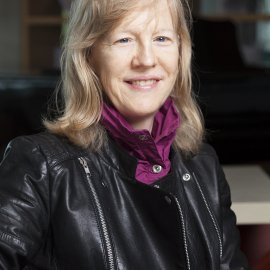History, University of Hong Kong, Hong Kong Special Administrative Region

Octobre 2018 à Juin 2019
Alexandra Cook received her doctorate at Cornell University in Ithaca, New York and has taught in The College of the University of Chicago, at Colgate University, and at Victoria University of Wellington, New Zealand. She is currently Professor of Philosophy at the University of Hong Kong. She is a specialist on Jean-Jacques Rousseau, the Enlightenment, and the history of science as well as having strong interests in the history of medicine and environmental thought. Professor Cook has authored numerous publications on Rousseau’s scientific interests, including Jean-Jacques Rousseau and botany: The salutary science (Oxford, 2012), which was awarded the prestigious 2013 John Thackray Medal of the Society for the History of Natural History (London). In 2009-2012 she served as curator of the Rousseau tercentenary exhibit, ‘Je raffole de la botanique’, at the Conservatoire et jardin botaniques of Geneva, Switzerland, later displayed in the Parc Rousseau, Ermenonville, France, in 2015. In addition to having published a new translation of Rousseau’s botanical works in Collected Writings of Rousseau, volume 8 (2000), she is editing these works in a new version for Rousseau’s Œuvres complètes (Paris: Classiques Garnier, forthcoming). Professor Cook is a Fellow of the Linnean Society (London).
Bioprospecting Asia: Laurent Garcin (c. 1681-1751) and the circulation of natural knowledge
This case study in early-modern natural knowledge collection, circulation and accumulation within the context of connected, or circulatory historiographies foregrounds local knowledge and practices exchanged within ‘heterogeneous…networks of specialised trade, politics, religion and medicine’ (Kapi Raj). Through circulation natural knowledge comes to be cross-culturally shared, transferred, translated and transformed. Grounded in this understanding, my project examines the contributions of Laurent Garcin (1681-1751), a Francophone Dutch East India Company ship’s surgeon of Huguenot-Swiss extraction, who prospected for medicinal plants and medical remedies throughout maritime Asia. As I have shown elsewhere, his herbarium provided 25% of the physical specimens referenced by a significant work of Asian botany, Nicolaas Burman’s Flora Indica (1768). Commemorated by the genus Garcinia, Garcin has been ranked among the ‘pioneers of the botanical exploration of the continental as well as insular areas of Asia’ (Staples and Jacquemoud), and yet he is now virtually unknown. My study demonstrates not only Garcin’s importance as an agent of knowledge circulation, but also how his work informs the recent turn in ethnopharmacology toward bioprospecting in texts and other historical materials for plant-based materia medica.
Sole-authored monograph:
Jean-Jacques Rousseau and Botany: The Salutary Science, Oxford: The Voltaire Foundation, 2012, xxii + 436 p., 3 appendices, 48 ills. [winner of John Thackray Medal, Society for the History of Natural History (U.K.)].
Book chapters:
“An idea Ahead of Its Time: Jean-Jacques Rousseau’s Mobile Botanical Laboratory”, lead chapter in M. Klemun and U. Spring (eds.), Expeditions as Experiments: Practising Observation and Documentation (Palgrave MacMillan, October 2016): 27-49.
“Le ‘disciple’ critique ‘le maître’: Jean Jacques Rousseau et la nomenclature linnéenne”, in Denis Reynaud and Philippe Selosse (eds.) Nomenclatures au dix-huitième siècle: la science, ‘langue bien faite’. Lyon: Presses de l’Aristoloche (2015): 151-65.
Journal articles:
“Laurent Garcin, M.D. F.R.S.: A Forgotten Source for N. L. Burman’s Flora Indica (1768)”, Harvard Papers in Botany 21/1 (July 2016): 31-53. [International, peer-reviewed journal published by Harvard University]
“Linnaeus and Chinese Plants: A Test of the Linguistic Imperialism Thesis”, Notes and Records of the Royal Society 64 (published online September 2009; print June 2010): 121-38. [International, peer-reviewed journal published by the Royal Society of London].